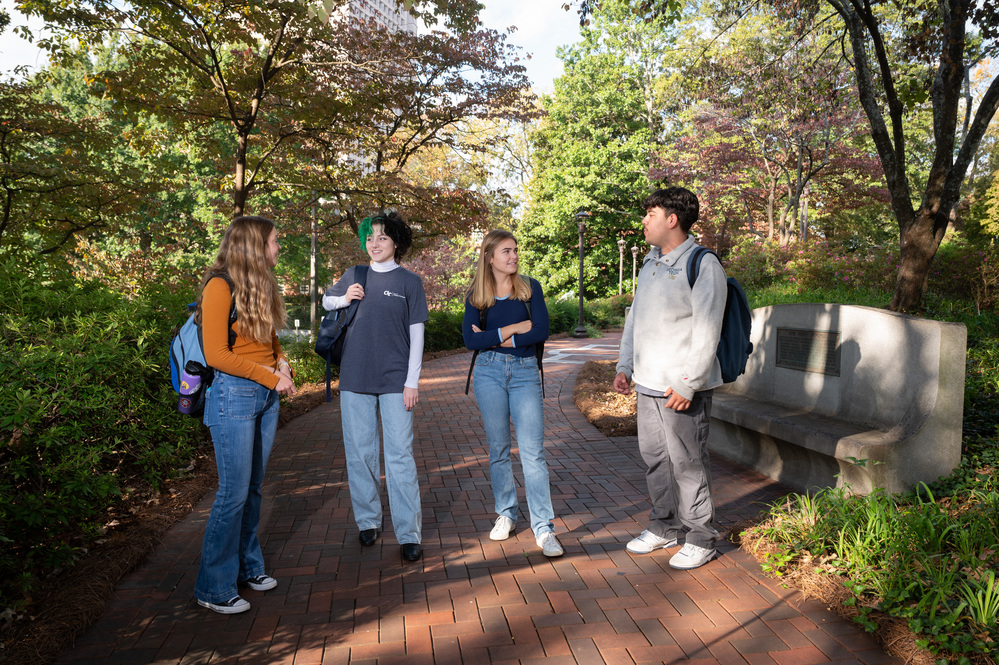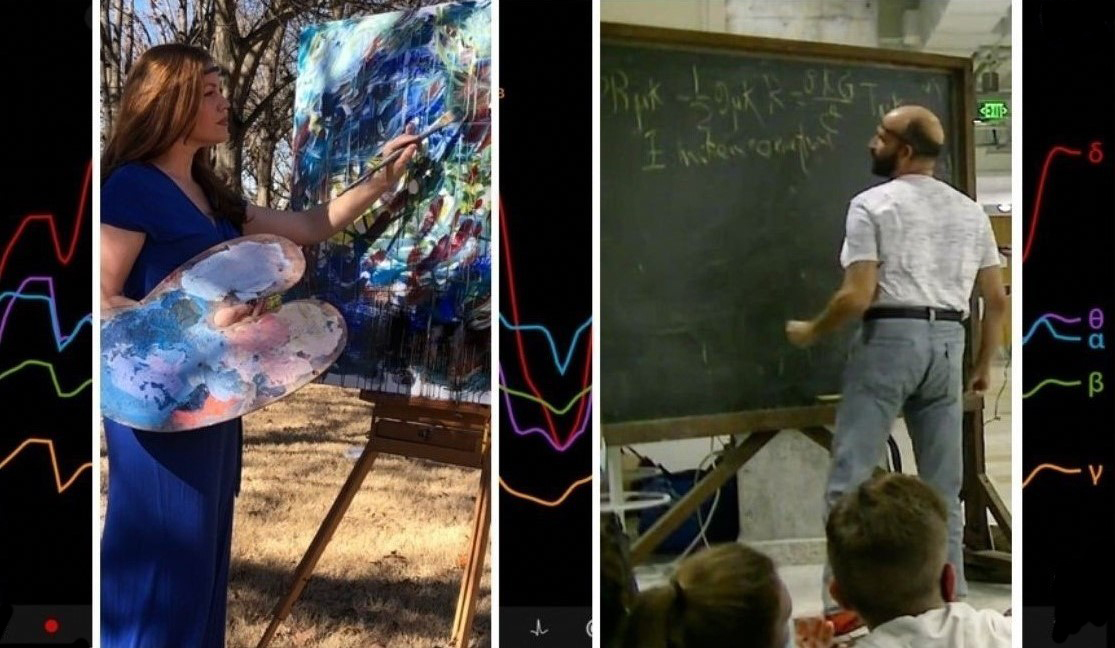2024 C21U Impact Report

Championing Our Students
Canvas Enhancements
Our Digital Learning Technologies team has been working on Canvas enhancements to provide Georgia Tech students, instructors, and facilitators with a better user experience, which in turn helps the learner and the educator in their education journey. For each of these initiatives, these efforts were managed by C21U Matt Lisle or Eric Sembrat, former and current director of digital technologies, and developed by Stuart Freeman, applications developer lead, and Christopher Yang, developer.
These enhancements by the digital technologies team include:
- 2021: Chris Yang, C21U application developer, designed and developed significant updates to the Key Performance Indicator (KPI) automated Canvas tool available for instructors to leverage and track student performance self-assessment. The KPI tool was initially developed to help instructors monitor the student learning experience and gain insight into enhancing learning in remote and hybrid courses. However, the initial group of testers made it clear that this tool would also be helpful in classes in an in-person format. The team updated functionality to facilitate the return of in-person instruction, additional prompt feedback mechanisms, and data visualization updates.
- 2022: Established an edX data loader and enhancements to optimize the availability of MOOC edX data for research by the Georgia Tech online master’s in computer science (OMSCS) as a testbed for future collaborative and strategic research into online educational utilization and effectiveness. The team also updated the PostEm tool for sorting + search capabilities.
- 2023: Planned and developed a course section manager self-service tool, an infrastructure configuration management for Canvas tools via Terraform, a course student importer via campus entitlements and permissions, a tool for connecting AI-ALOE’s Jill Watson outside of Georgia Tech, piloted with the Technical College System of Georgia. They also audited and sunset the legacy customizations course description and + CourseType.
During the spring semester of 2024, the digital learning team at Georgia Tech OIT welcomed its first applications developer, Anusha Chintapally. This opened significant opportunities for C21U's digital learning technologies team to focus more on research-based application development and collaborate on larger development projects. Some of these are developing new functionality to enroll custom courses (internally known as "project sites") based on campus user account permissions, finalizing preferred name usage across Canvas, and continuing automation efforts to publish grades from Canvas to Banner. The team also started strategic discussions on more significant initiatives, such as course data retention policy expirations and custom tool updates to the latest specification standard (LTI 1.3).



VIP Teaching and Learning
Georgia Tech’s Vertically Integrated Projects (VIP) Program is a transformative approach to enhancing higher education by engaging undergraduate and graduate students in ambitious, long-term, large-scale, multidisciplinary project teams led by faculty. Teams of undergraduate students – from various years, disciplines, and backgrounds – work with faculty and graduate students in their areas of scholarship and exploration. From 2021 to 2024, Jonna Lee, director of research in education, and Meryem Yilmaz Soylu, research scientist, taught and led numerous teams in their own research and invited a selected group to participate in a pilot program.

Data-driven Education and Mentorship
In the last three years, Jonna and Meryem have supported over 100 Georgia Tech undergraduate and graduate students who actively experimented and conducted innovative research on four topic areas: assessment quality assurance, discussion forums, just-in-time intervention, and AI in education. “Our classes combine data science, including AI-based analysis, with educational theory. We strive to research and develop web-based tools for students and faculty to improve educational content, instruction, and learning at Tech. Each semester, we look forward to working with students who bring exciting and transformative ideas aligned with our objectives. We consider ourselves fortunate to be able to assist them in turning these ideas into actionable research,” Jonna shared.
Their instructional approach and technologies include data, learning analytics, educational research, learning science, social statistics, hypothesis testing, and web applications. They also actively engage with the Tech community. “Our VIP teams work on projects occasionally requiring user feedback, insights, or clarification outside our classroom. In response to this need, we contact our Tech colleagues for support, often leading to connecting with new professionals in the field. These interactions ensure the success of our VIP students' projects and create opportunities for us as instructors and researchers to collaborate further,” explained Meryem.
As Aviv Alexander Loewenstein, a former VIP student, expressed, the program provides the opportunity to work in teams while also being mentored by their instructors: "We were immediately thrown into research and development, working on cutting-edge problems. The instructors did a fantastic job introducing us to the material and helping us build the teams based on our interests, skills, and backgrounds throughout the program. Dr. Soylu and Dr. Lee guided and supported us in leading the research.”
User Experience Study: Class.com
In the fall 2023 and spring 2024 semesters, C21U evaluated use cases and the user experience of Class.com, a startup product created as a Zoom add-on to assist teachers in optimizing its use within classroom settings. The study evaluated whether the product increased engagement, facilitated collaboration, and enhanced student performance in project-based learning. The team, led by Jonna Lee, director of research in education; Meryem Yilmaz, Soylu, research scientist; Stephen Harmon, executive director; and Eric Sembrat, director of digital learning technologies, piloted the platform in a VIP class. Jonna and Meryem held some presentations and discussions online and connected online OMSCS students with their in-class weekly meetings.
Most participants (85%) reported positive learning outcomes from using Class.com for remote instruction. One student interviewed highlighted the utility of features like the chat function and window overlay, which facilitated multitasking during presentations without disruptive pop-ups, unlike Zoom. However, participants encountered significant challenges due to common technical issues with screen-sharing features, particularly during presentations where their use was essential. Acknowledging these challenges, we prioritized interactive and intuitive design to ensure a seamless user journey. We continuously assessed how the platform enhanced user engagement and adoption by facilitating natural interaction between students and instructors through these features.
From two semesters of experience and observation, the team concluded that while Class.com delivered positive learning outcomes and useful features for remote instruction, significant technical challenges must be addressed, particularly with screen sharing. Our findings will inform developers and help create instructional design strategies to improve learning performance while using this platform and similar products.
STEAM: Art and Geometry Class Project
Creativity is essential for driving adaptability and innovation. In 2022 Meryem Yilmaz Soylu and Jonna Lee investigated how a graduate-level advanced geometry course combining art impacted students' creativity. One of C21U’s strengths is our ability to assist faculty in conducting Learning Sciences research in their own disciplines. The “Arts and Geometry” STEAM Georgia Tech course was a collaborative effort led by Francesco Fedele, associate professor in the School of Civil and Environmental Engineering and the School of Electrical and Computer Engineering, and professional visual artist Rachel Evans Grant. The course introduced engineering students to manifold geometry, covering basic shapes like cylinders and spheres and more complex surfaces like crumpled paper or kale leaves. The course included geometry lectures and weekly art lab sessions, exploring the influence of these geometric concepts on modern arts and sciences.
After the course concluded, the research team conducted focus group interviews to gather students' perspectives, searching for insights into their experiences with the curriculum and its, such as the Abbreviated Torrance Test for Adults and the Divergent Association Task, influence on their learning journey and creative abilities. The team also used creative measures such as the Abbreviated Torrance Test for Adults and the Divergent Association Task to capture various components of creative thinking (e.g., fluency, originality, problem-solving, flexibility) among students. The study highlighted how art-related activities and materials positively influenced students’ learning in geometry and beyond. Many valued the opportunity to develop skills like "thinking freely and fluidly." For instance, one student stated, “My favorite part was the whole objective of freeing your mind from the constraints of our regular engineering classes and everything.” Also, students appeared to perceive doing the art activity as something creative, and they felt they were learning something new. “Just being able to come down and learn from … a real artist. And just to try like a whole bunch of different methods, like charcoal and graphite and oil paints … that was very cool,” another student said. Our research established that courses like this one, which combined graduate-level advanced geometry with visual art, can enhance creativity.
The findings were shared with colleagues at the C21U brown bag event titled “Art and Research in the Classroom” in 2022. The team is currently working on a paper for a future journal publication.

